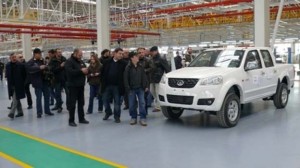
The first car rolls off the assembly plant at the new Great Wall factory in Bulgaria, China's first in the EU.
Europe’s ongoing debt crisis has been crippling the Continental economy, sending automakers into a tailspin. By most estimates, European car sales will buck the global turnaround and post at least a modest decline this year.
But that could be good news for the Chinese automaker Great Wall Motor which hopes to appeal to increasingly budget-minded European buyers with models like the Hover SUV, Steed pickup and Voleex city car. All three will be produced at a new plant in the village of Bahovitsa, Bulgaria, and carry prices ranging from around $11,000 to $16,000.
While Bulgaria itself is not a name normally associated with car manufacturing what’s all the more significant is that the three products will be produced at what is the first Chinese-run auto plant in the European Union. The factory is part of a joint venture between Great Wall and its Bulgarian partner Litex Motors.
That might come as a surprise to some – and for several reasons. While China’s increasingly ambitious automakers have long discussed their options abroad they have, until now, largely focused on feeding their fast-growing domestic automotive market – now the world’s largest. But as the pace of growth has begun to slip analysts say it will be little surprise to see the Chinese begin to look abroad.
Most makers are pulling together export strategies, however, hoping to take advantage of China’s low labor rates. But Great Wall is following the example of better-established Western and Japanese makers by putting a plant close to where its market is.
Of course, Bulgaria isn’t Germany or France or the U.K., and while the maker hasn’t disclosed details, observers believe labor costs at the Bahovitsa plant likely aren’t all that much more than what they would be in China, where automotive labor rates have been rising rapidly, anyway. And any gap that remains will likely be more than offset by lower shipping costs, among other things.
Though the workforce is generally well-educated, Bulgaria is the European Union’s poorest country and generally considered an oasis of cheap wages and low taxes.
“Great Wall’s plans to build a plant in Bulgaria and produce automobiles here are aimed at boosting our production capacity and exporting these automobiles for the European market,” the maker’s president and chief executive Feng Ying Wang said during the dedication of the Bulgarian plant.
The plant is initially planning to produce just 4,000 vehicles annually, and will start with a minimal 150 employees. That will grow to 2,000 by 2013 as capacity expands and more of the work is actually handled in Bahovitsa. The 5 million square-foot plant is reportedly capable of producing about 50,000 vehicles annually.
“We estimate that in three to five years we will have a wide range of models made here and that these cars will be sold in all European countries,” added Great Wall’s CEO.
A small number of Chinese products have begun to squeeze through the old Bamboo Curtain. Honda has been exporting subcompact Jazz models from its plant in Guangzhou to the EU – and recently announced a small number, sold as the Honda Fit, will go to Canada.
The Great Wall plant will soon have company, as China’s Chery has purchased a plant Fiat is abandoning in Sicily as part of a joint venture with Italy’s DR Motor.
And, technically, Volvo’s plants are now Chinese, as the maker was purchased by Geely two years ago.
Great Wall, meanwhile, has not only set up the Bulgarian assembly plant but factories in a dozen other countries including Russia, Indonesia and Egypt.
